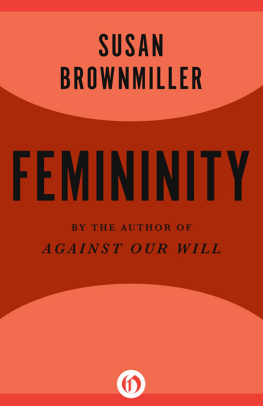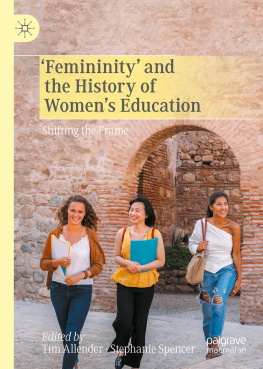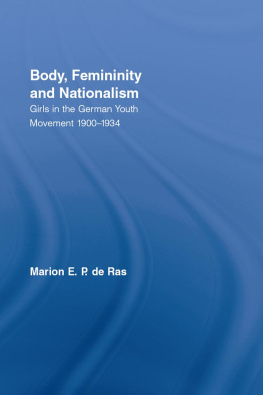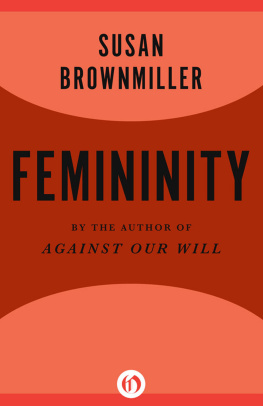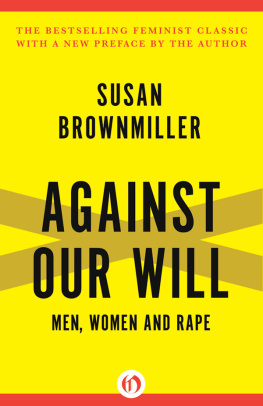Susan Brownmiller - Femininity
Here you can read online Susan Brownmiller - Femininity full text of the book (entire story) in english for free. Download pdf and epub, get meaning, cover and reviews about this ebook. year: 2013, publisher: Open Road Integrated Media, genre: Romance novel. Description of the work, (preface) as well as reviews are available. Best literature library LitArk.com created for fans of good reading and offers a wide selection of genres:
Romance novel
Science fiction
Adventure
Detective
Science
History
Home and family
Prose
Art
Politics
Computer
Non-fiction
Religion
Business
Children
Humor
Choose a favorite category and find really read worthwhile books. Enjoy immersion in the world of imagination, feel the emotions of the characters or learn something new for yourself, make an fascinating discovery.
- Book:Femininity
- Author:
- Publisher:Open Road Integrated Media
- Genre:
- Year:2013
- Rating:5 / 5
- Favourites:Add to favourites
- Your mark:
- 100
- 1
- 2
- 3
- 4
- 5
Femininity: summary, description and annotation
We offer to read an annotation, description, summary or preface (depends on what the author of the book "Femininity" wrote himself). If you haven't found the necessary information about the book — write in the comments, we will try to find it.
Femininity — read online for free the complete book (whole text) full work
Below is the text of the book, divided by pages. System saving the place of the last page read, allows you to conveniently read the book "Femininity" online for free, without having to search again every time where you left off. Put a bookmark, and you can go to the page where you finished reading at any time.
Font size:
Interval:
Bookmark:


WE HAD A GAME in our house called setting the table and I was Mothers helper. Forks to the left of the plate, knives and spoons to the right. Placing the cutlery neatly, as I recall, was one of my first duties, and the event was alive with meaning. When a knife or a fork dropped to the floor, that meant a man was unexpectedly coming to dinner. A falling spoon announced the surprise arrival of a female guest. No matter that these visitors never arrived on cue, I had learned a rule of gender identification. Men were straight-edged, sharply pronged and formidable, women were softly curved and held the food in a rounded well. It made perfect sense, like the division of pink and blue that I saw in babies, an orderly way of viewing the world. Daddy, who was gone all day at work and who loved to putter at home with his pipe, tobacco and tool chest, was knife and fork. Mommy and Grandma, with their ample proportions and pots and pans, were grownup soup spoons, large and capacious. And I was a teaspoon, small and slender, easy to hold and just right for pudding, my favorite dessert.
Being good at what was expected of me was one of my earliest projects, for not only was I rewarded, as most children are, for doing things right, but excellence gave pride and stability to my childhood existence. Girls were different from boys, and the expression of that difference seemed mine to make clear. Did my loving, anxious mother, who dressed me in white organdy pinafores and Mary Janes and who cried hot tears when I got them dirty, give me my first instruction? Of course. Did my doting aunts and uncles with their gifts of pretty dolls and miniature tea sets add to my education? Of course. But even without the appropriate toys and clothes, lessons in the art of being feminine lay all around me and I absorbed them all: the fairy tales that were read to me at night, the brightly colored advertisements I pored over in magazines before I learned to decipher the words, the movies I saw, the comic books I hoarded, the radio soap operas I happily followed whenever I had to stay in bed with a cold. I loved being a little girl, or rather I loved being a fairy princess, for that was who I thought I was.
As I passed through a stormy adolescence to a stormy maturity, femininity increasingly became an exasperation, a brilliant, subtle esthetic that was bafflingly inconsistent at the same time that it was minutely, demandingly concrete, a rigid code of appearance and behavior defined by dos and dont-dos that went against my rebellious grain. Femininity was a challenge thrown down to the female sex, a challenge no proud, self-respecting young woman could afford to ignore, particularly one with enormous ambition that she nursed in secret, alternately feeding or starving its inchoate life in tremendous confusion.
Dont lose your femininity and Isnt it remarkable how she manages to retain her femininity? had terrifying implications. They spoke of a bottom-line failure so irreversible that nothing else mattered. The pinball machine had registered tilt, the game had been called. Disqualification was marked on the forehead of a woman whose femininity was lost. No records would be entered in her name, for she had destroyed her birthright in her wretched, ungainly effort to imitate a man. She walked in limbo, this hapless creature, and it occurred to me that one day I might see her when I looked in the mirror. If the danger was so palpable that warning notices were freely posted, wasnt it possible that the small bundle of resentments I carried around in secret might spill out and place the mark on my own forehead? Whatever quarrels with femininity I had I kept to myself; whatever handicaps femininity imposed, they were mine to deal with alone, for there was no womens movement to ask the tough questions, or to brazenly disregard the rules.
Femininity, in essence, is a romantic sentiment, a nostalgic tradition of imposed limitations. Even as it hurries forward in the 1980s, putting on lipstick and high heels to appear well dressed, it trips on the ruffled petticoats and hoopskirts of an era gone by. Invariably and necessarily, femininity is something that women had more of in the past, not only in the historic past of prior generations, but in each womans personal past as wellin the virginal innocence that is replaced by knowledge, in the dewy cheek that is coarsened by age, in the inherent nature that a woman seems to misplace so forgetfully whenever she steps out of bounds. Why should this be so? The XX chromosomal message has not been scrambled, the estrogen-dominated hormonal balance is generally as biology intended, the reproductive organs, whatever use one has made of them, are usually in place, the breasts of whatever size are most often where they should be. But clearly, biological femaleness is not enough.
Femininity always demands more. It must constantly reassure its audience by a willing demonstration of difference, even when one does not exist in nature, or it must seize and embrace a natural variation and compose a rhapsodic symphony upon the notes. Suppose one doesnt care to, has other things on her mind, is clumsy or tone-deaf despite the best instruction and training? To fail at the feminine difference is to appear not to care about men, and to risk the loss of their attention and approval. To be insufficiently feminine is viewed as a failure in core sexual identity, or as a failure to care sufficiently about oneself, for a woman found wanting will be appraised (and will appraise herself) as mannish or neutered or simply unattractive, as men have defined these terms.
We are talking, admittedly, about an exquisite esthetic. Enormous pleasure can be extracted from feminine pursuits as a creative outlet or purely as relaxation; indeed, indulgence for the sake of fun, or art, or attention, is among femininitys great joys. But the chief attraction (and the central paradox, as well) is the competitive edge that femininity seems to promise in the unending struggle to survive, and perhaps to triumph. The world smiles favorably on the feminine woman: it extends little courtesies and minor privilege. Yet the nature of this competitive edge is ironic, at best, for one works at femininity by accepting restrictions, by limiting ones sights, by choosing an indirect route, by scattering concentration and not giving ones all as a man would to his own, certifiably masculine, interests. It does not require a great leap of imagination for a woman to understand the feminine principle as a grand collection of compromises, large and small, that she simply must make in order to render herself a successful woman. If she has difficulty in satisfying femininitys demands, if its illusions go against her grain, or if she is criticized for her shortcomings and imperfections, the more she will see femininity as a desperate strategy of appeasement, a strategy she may not have the wish or the courage to abandon, for failure looms in either direction.
It is fashionable in some quarters to describe the feminine and masculine principles as polar ends of the human continuum, and to sagely profess that both polarities exist in all people. Sun and moon, yin and yang, soft and hard, active and passive, etcetera, may indeed be opposites, but a linear continuum does not illuminate the problem. (Femininity, in all its contrivances, is a very active endeavor.) What, then, is the basic distinction? The masculine principle is better understood as a driving ethos of superiority designed to inspire straightforward, confident success, while the feminine principle is composed of vulnerability, the need for protection, the formalities of compliance and the avoidance of conflictin short, an appeal of dependence and good will that gives the masculine principle its romantic validity and its admiring applause.
Next pageFont size:
Interval:
Bookmark:
Similar books «Femininity»
Look at similar books to Femininity. We have selected literature similar in name and meaning in the hope of providing readers with more options to find new, interesting, not yet read works.
Discussion, reviews of the book Femininity and just readers' own opinions. Leave your comments, write what you think about the work, its meaning or the main characters. Specify what exactly you liked and what you didn't like, and why you think so.

